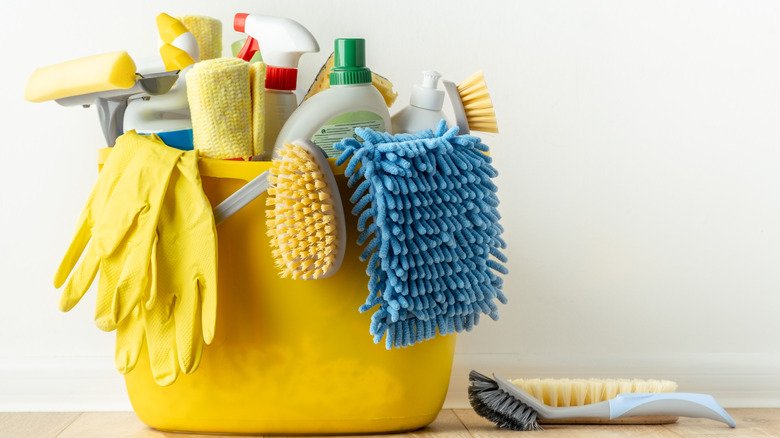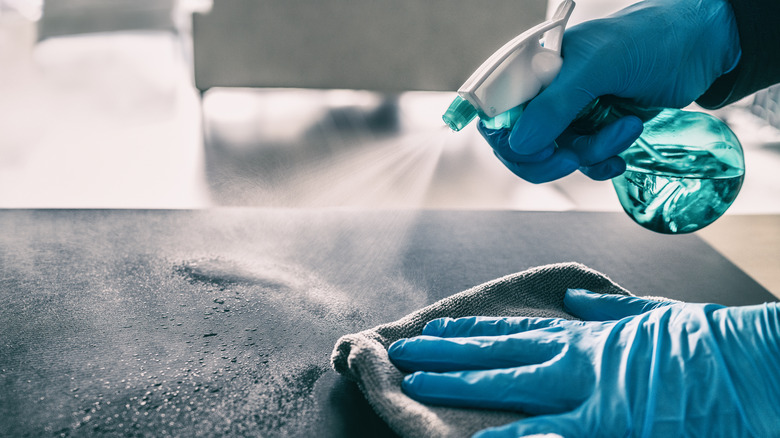How Dumping Extra Product Into A Cleanup Job Can Backfire
Cleaning tips, tricks, and hacks are everywhere, each one trying to make cleaning your home faster and more effective. If these are your specific goals, you may wonder if using more of a cleaning product than is recommended can cause it to work better and faster than if you use less. Unfortunately, this is not true. Instead, using too much of your favorite cleaner during your cleaning routine actually causes surfaces to collect more grime, not to mention that it also leads to potential safety and plumbing concerns.
Taking this more-is-more approach to the limit, a new popular cleaning trend on TikTok dubbed "toilet overload" is a recipe for disaster, as it encourages viewers to dump excessive amounts of powder and liquid cleaners into a toilet or sink to create a thick lather. While this is certainly more extreme than your average homeowner doubling or tripling up on one cleaning product in an attempt to get better results, it clearly spells out in a maximal way the issues one could face by using too much product. Besides being a complete waste of product that ends up costing you more money, using too much cleaner can also be bad for your surfaces, plumbing, and health.
Issues caused by using too much cleaning product
One issue that homeowners will experience when they use too much cleaning product at one time is that it may not fully come off during the rinsing process due to the high concentration, therefore leaving a film on the surface you are cleaning. This film attracts more dirt and dust than normal, which is the exact opposite outcome anyone is looking for when cleaning. Continuing to use too much cleaner will build up the film over time, making the issue worse the longer this process continues.
Another major safety concern with using too much product is that un-rinsed residue left behind can interact with other cleaning products, resulting in potentially-toxic fumes. In addition, exposure to too much chemical cleaner on its own could be enough to cause respiratory concerns if there is not proper ventilation in a small space like a bathroom. Using too much of one chemical and/or mixing cleaning agents could pose health risks to a homeowner and their family, so this product overload is not worth the risk.
Finally, using too much cleaner could lead to problems with your plumbing or surfaces. Because some cleaners can be corrosive, using too much or not diluting it properly with water could erode the protective layer of your surfaces and lead to damage. In addition, some cleaners form thick slurries when inappropriately mixed with other products, which could lead to a pipe blockage when disposed of down a drain.
How to get the most out of your cleaning products
The best way to get the most out of your favorite cleaning products is to use them as directed on the label, as that is how they were formulated to function at their prime. Additionally, use only one cleaning product at a time to avoid creating any accidental dangerous fumes from the mixing of chemicals. Finally, if the label recommends rinsing off the product after using it, do not skip this step. Neglecting a thorough rinse could cause the film build up you are trying to avoid.
Another way to get the most out of your products is to use proper techniques when applying them. Almost all household surfaces (such as windows, countertops, appliances, furniture, electronics, etc.) can be cleaned with a soft, microfiber cloth, a safe tool for applying cleaning products that will not damage surfaces. Unless your label states otherwise, apply cleaners directly to the microfiber cloth, then use the simple "S" pattern cleaning method to keep your home sparkling with the most effective and efficient motion, ensuring the product is applied consistently and thoroughly. Follow the label for specific instructions regarding letting the product soak, special application details, and rinsing requirements to get the best results out of each individual cleaner.


